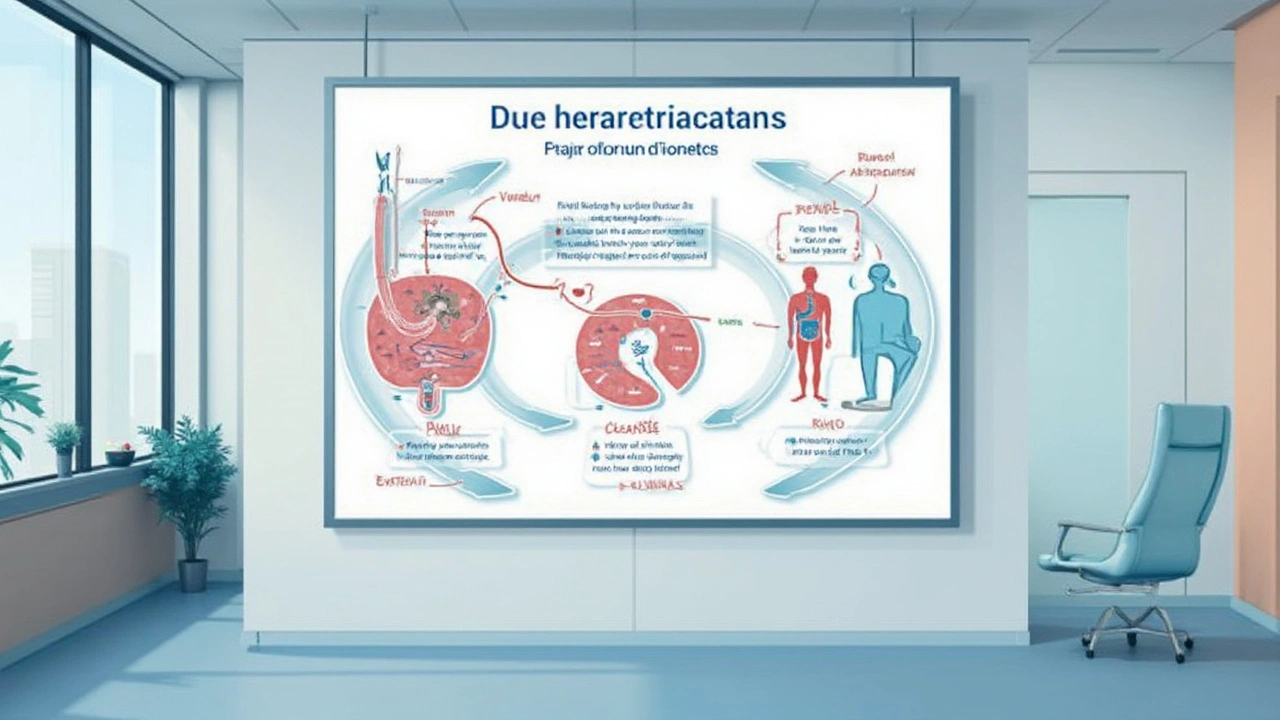This article takes a practical, in-depth look at the pharmacokinetics of levetiracetam, focusing on its absorption, metabolism, and renal clearance. It highlights real-world facts and tips clinicians should know to avoid dosing errors or complications. The discussion breaks down how levetiracetam behaves in different patients—from healthy adults to those with kidney disease. Expect useful monitoring tips and interesting findings about this staple anti-seizure medication.
Absorption: How Drugs Get Into Your Body and What Changes It
Absorption is the step where a drug moves from where you take it (pill, cream, inhaler) into the bloodstream. If a medicine never gets into your blood, it can’t reach the target and won’t work. That’s why absorption matters more than you might think—timing, food, other meds, and even stomach acid all change how much drug actually reaches you.
Common factors that change drug absorption
Formulation: Immediate‑release pills dissolve quickly, while extended‑release tablets are made to dissolve slowly. Crushing an extended‑release tablet can dump the whole dose at once and cause side effects or poor control.
Food and stomach contents: Some medicines absorb better with food (helps dissolve the drug), others need an empty stomach. High‑fat meals often increase absorption of fat‑soluble drugs but can slow or reduce others.
pH and stomach acid: Antacids, PPIs, and H2 blockers raise stomach pH and can reduce absorption for drugs that need acid. Think about iron, some antifungals, and certain antibiotics.
Interactions with other drugs and supplements: Calcium, magnesium, and iron bind some antibiotics and thyroid pills, stopping absorption. Grapefruit juice blocks enzymes and can spike levels of certain drugs—dangerous in some cases.
GI motility and health: If you have fast transit (diarrhea) or slow transit (constipation), absorption changes. Gut surgeries, inflammatory bowel disease, and some infections alter how much drug gets through.
Practical tips to get the most from your medicine
Read the label and follow timing: If the bottle says "take on an empty stomach," that usually means 1 hour before or 2 hours after a meal. If it says "with food," take it with a meal or snack to avoid stomach upset and improve absorption.
Separate interacting substances: Take minerals like calcium or iron at least 2–4 hours away from antibiotics such as tetracyclines or fluoroquinolones, and from levothyroxine. Ask your pharmacist for exact spacing.
Avoid grapefruit juice unless your doctor says it’s safe. It affects many drugs used for blood pressure, cholesterol, and immune suppression.
Don’t crush or split extended‑release or enteric‑coated tablets unless a healthcare pro says it’s okay. That alters the release and absorption pattern.
Topical and transdermal tips: Apply creams to clean, dry skin without lotions. Heat (heating pads, hot baths) can increase skin absorption of patches and raise drug levels unexpectedly.
Talk to your pharmacist or doctor if you have digestive surgery, chronic diarrhea, or are on multiple meds. They can recommend alternative forms (liquid, patch, injection) or adjust dosing to match your body’s absorption.
Small changes in absorption can mean a drug works too little or causes side effects. If a medicine feels "off"—it isn’t helping or it causes new problems—ask for a review. A quick check can often fix timing, interactions, or the form of the medicine so it works the way you expect.

